
This past week marked the Ethiopian New Year, a transitional point bearing nuanced meaning for those celebrating from outside of the continental mainland. Each September, a new season is signified by the blossoming of the Meskel flower, known as the Adey Abeba in the Amharic language. It has come to represent beauty and survival in equal measure, reviving itself every year without fail across Ethiopian highlands despite harsh ecological conditions.
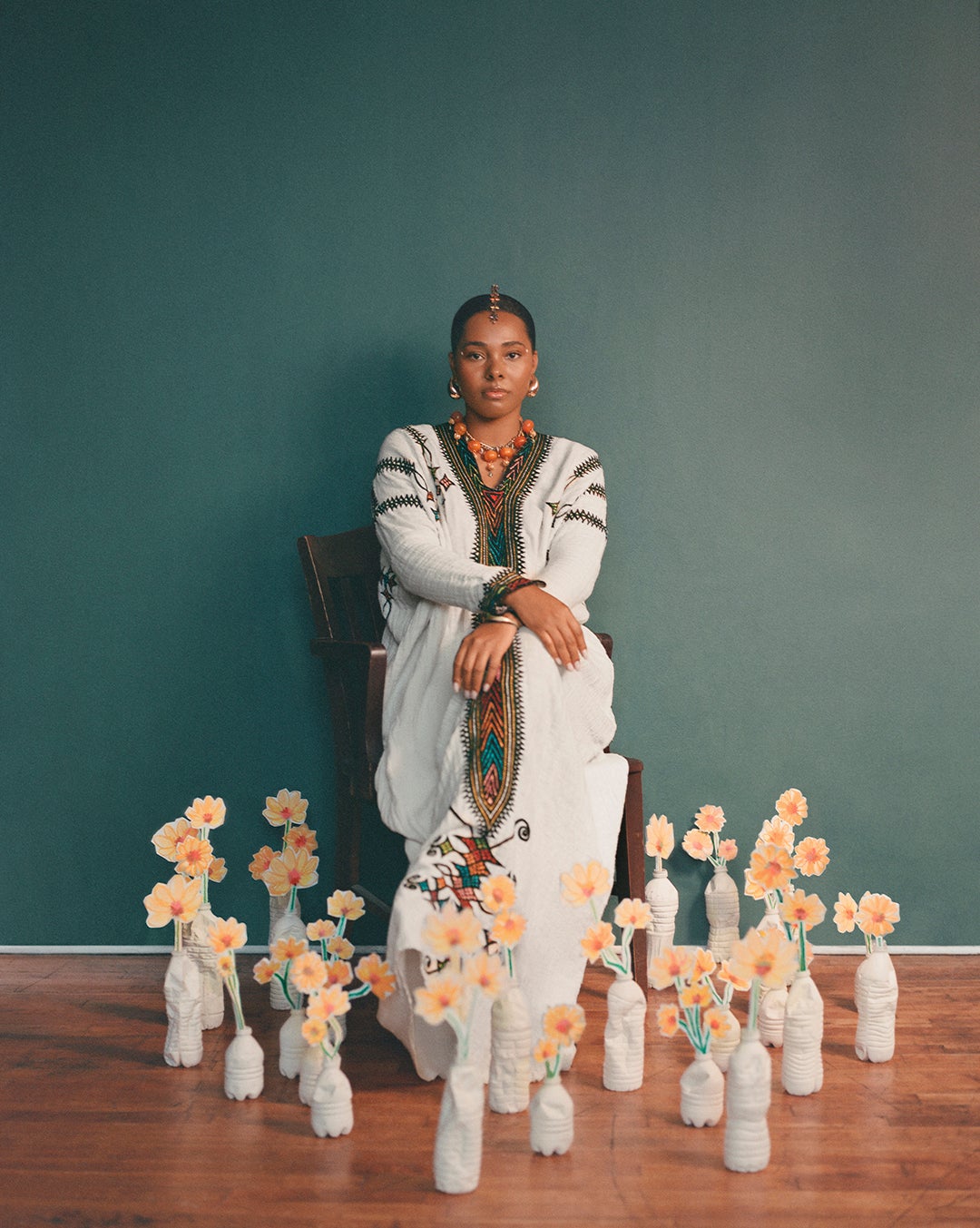
In Amharic, there is a level of linguistic interchangeability when referring to the flower, taking on meanings of youth, rebirth, and expansion simultaneously. For creatives like Ruhama Wolle, one of many global voices documenting the outpouring of an Ethiopian cultural renaissance currently unfolding, the iconography of the flower is not static. Its radiance and defiance mirror that of a new generation of artists channeling the tug of displacement and return as a source of expansive invention. In a new photo series entitled “Meskel Flower: A Love Letter to Ethiopia,” Wolle contends with self-declaration of home and identity unfettered by miles of distance.
Over the past two years, Wolle, an editor and creative producer has spent extended time in Ethiopia, returning to find a cultural rebirth amid the country’s political turmoil and genocide. In the country and its global diaspora, young people are creating work expanding the narrative of who they are and where they come from. This fruitfulness, though, is a paradox arriving during a continued reckoning with years of war, loss, and unrest that have caused many Ethiopians to contend with the meaning of homeland.
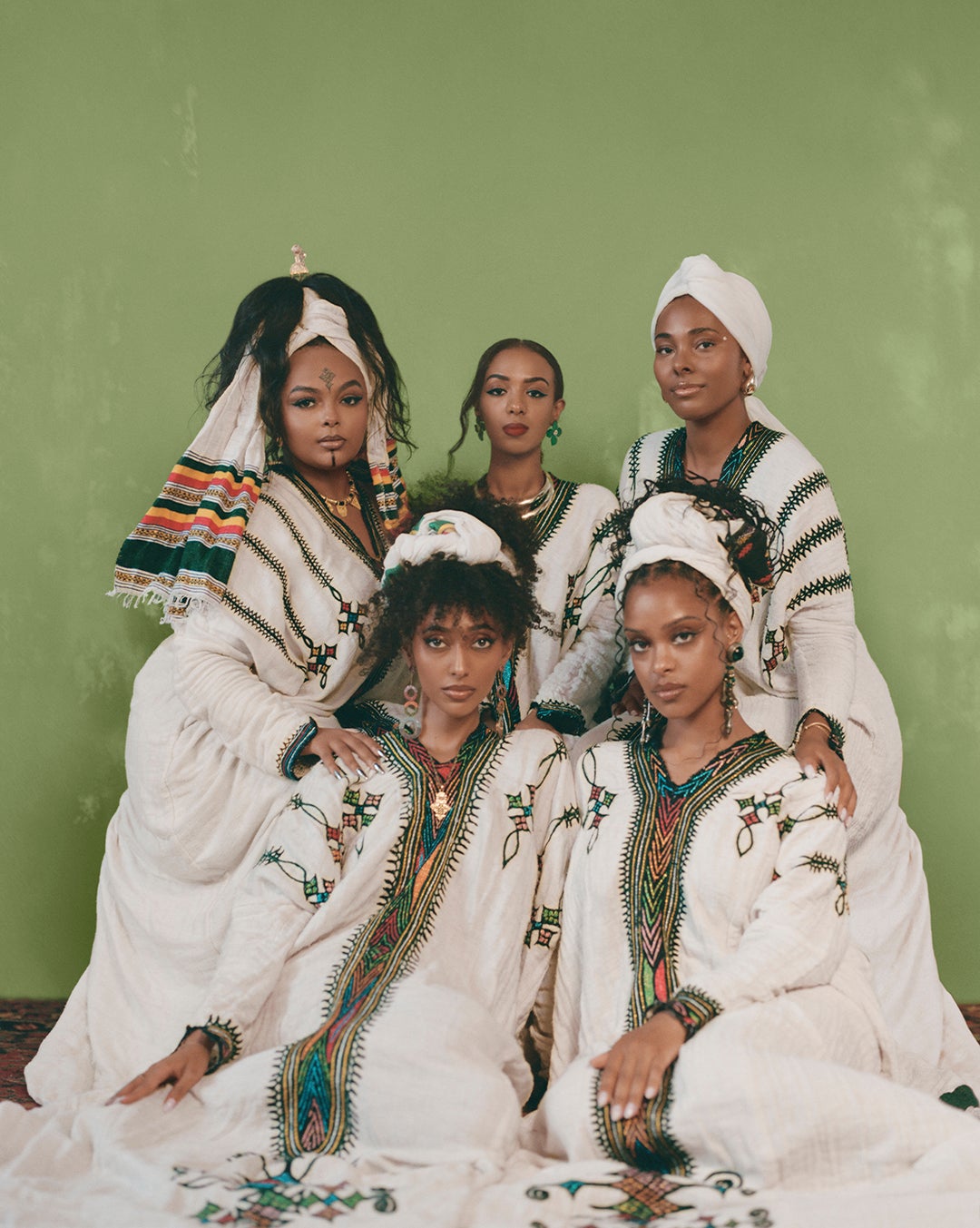
Artists like Wolle who spent the majority of their coming-of-age years outside of the country are now traversing the dimensions of transnational identity from the United States and elsewhere, utilizing their heritage as a connector to weighted pasts and yet unseen futures. Now as adults, these young people are reflecting through multimodal mediums of self-expression.
“I’ve come back from Ethiopia with a feeling I just cannot pinpoint,” Wolle tells ESSENCE. “I was in proximity with like folks my age, younger, and older, who are taking on Ethiopian life as creatives and running with this renaissance that’s happening.” Witnessing this phenomenon was deeply impactful, sparking questions in Wolle about her purpose as a creative in the diaspora. She established the “Meskel Flowers” project as a way to devise deeper meaning to the memory she carries of the country and her interpretation of its current moment of cultural vibrancy amidst pain. In devising the works, she was immediately struck by the interrupted chronology of representation, shocked by how few depictions of Ethiopian womanhood she could find on hand. This heightened her urgency to materialize the current moment in a similar way she has spent her career doing for others in visual form.
Wolle says she wanted to create something intentional on her own terms. “That means really thinking through what building more visuals of us really looks like.” She landed a thoughtful but scalable approach. Rather than try to seismically change the visual profile of Ethiopian heritage, she wanted to depict a component of what it means to hear, stationing her medium of choice within the traditional Ethiopian living room space.
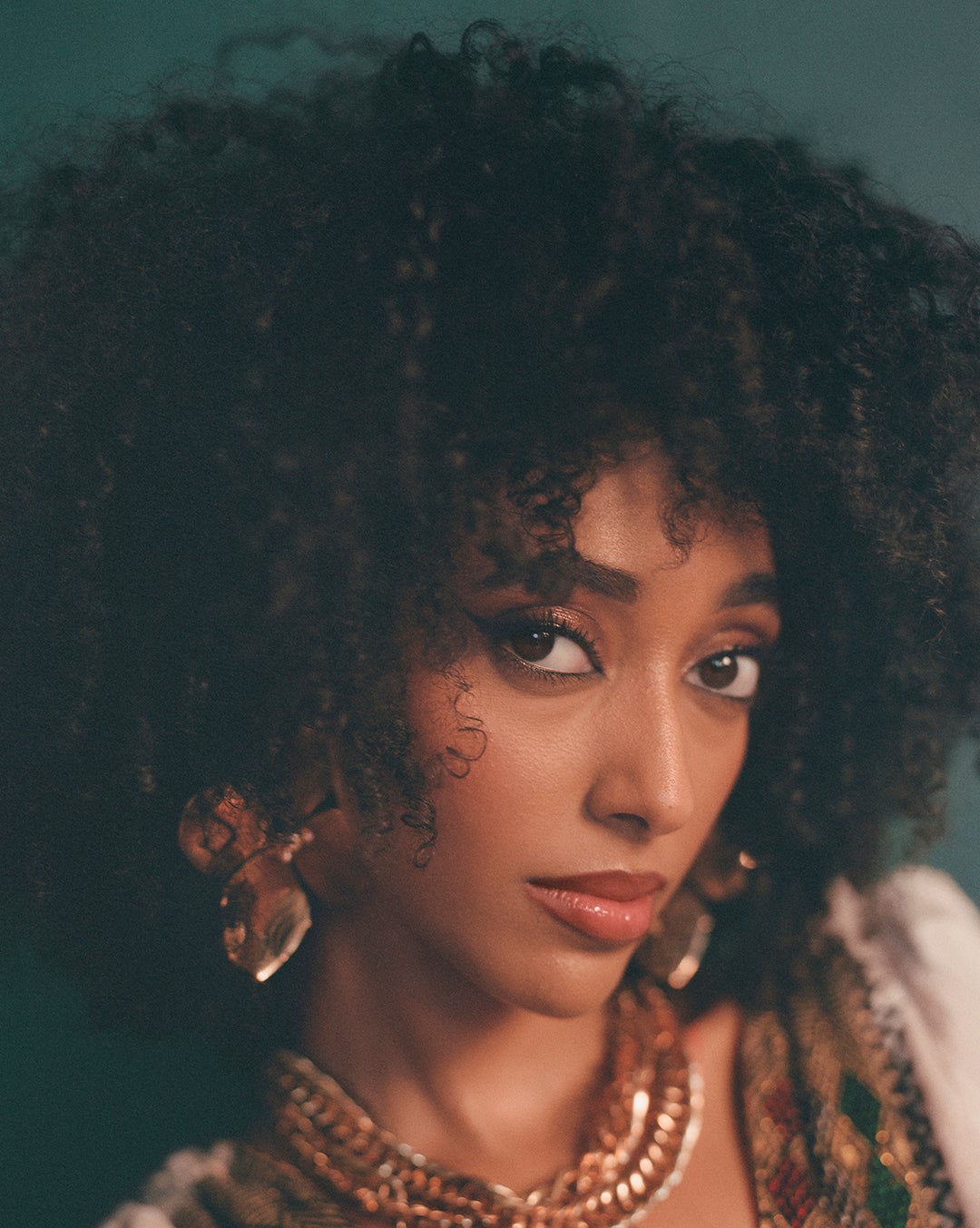
“The first person I brought into this was my photographer Elianel Clinton,” Wolle said. The two had worked together on a deeply personal project once before and the producer took comfort in returning to an artist with the familiarity and reverence for depicting intimate moments between loved ones. This new project in commemoration was something Wolle wanted to share with an image maker who demonstrated the ability to traverse the dimension of Black culture with a unified visual profile of softness and reflection.
“To recreate that feeling here was a matter of building a team,” Wolle explained. “I had a vision that I always wanted to do an Ethiopian living room, and recreate what home looks like for all of us, whether that’s home for somebody based in Ethiopia or somebody in Sweden or North Carolina.”
The living room remains intact and identifiable for the Habesha community throughout each of these migrational homes. Wolle and her creative team wanted to depict the space as a microcosm of cultural transference, a sacred space that resists the chaos of change. Within it, the braided hair, the ritual of a coffee ceremony, the cross-generational laughter beneath fragrant tendrils of incense —these are the indicators that keep the culture grounded, and what Wolle wanted to reflect in the images.
The set, designed by Ethiopia-based producer Rediet Haddis and created on-site by Zacharie Adams, was modeled after the recognizable signatures of an Ethiopian household, achieved through the collaboration of those within and in solidarity with the East African experience. The very achievement of the project is a statement in Pan-Africanist creative praxis, sourcing talent from those familiar with the ethos of homegoing and Black connectivity Wolle wanted to invoke, situating itself in the specific inheritances of Ethiopian history.
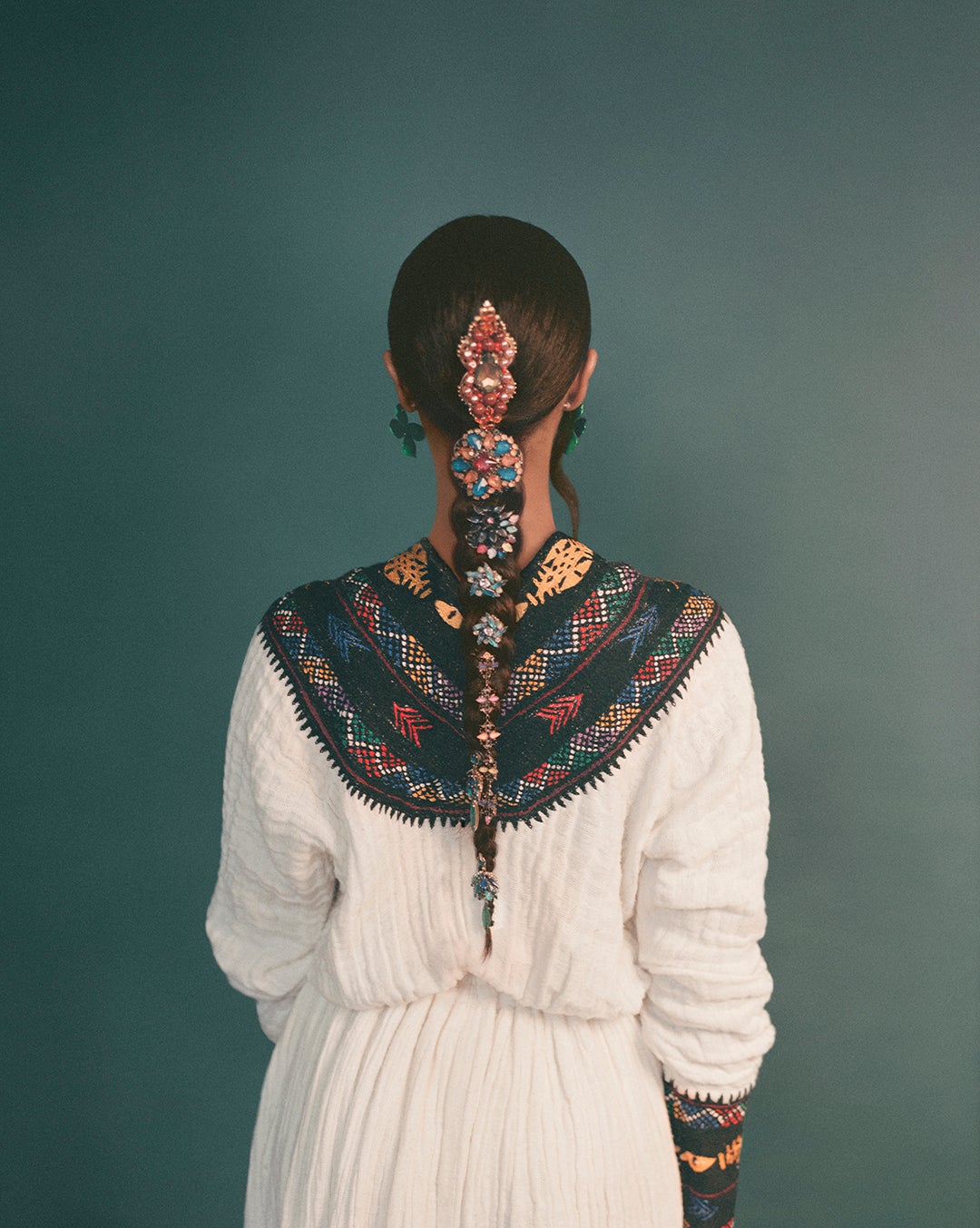
The living room, staged with motifs of woven baskets, and family photos, invites a sensory reenactment of cultural practice, launching the room as a site of stoicism, where memory and culture are not only preserved but actively reshaped. In these small, intimate spaces, Ethiopian heritage continues to breathe, unbroken by the distances of diaspora, presented now with youthful invitation. The return to childlike fascination was a key feature in achieving the tone of “Meskel Flowers.“
“I wanted us to think about play and like our inner child,” Wolle shared. “With the coffee set up, and just having fun with it, and braiding each other’s hair—I wanted it to remind us of when we were young and in our homes. I think my younger version of myself needed that release.”
By channeling their inner child, the creative team was able to filter the at-times painful but artistically fertile depths of Ethiopian history—its invocations of resistance, its enduring iconography—into a re-edit of diasporic presents for future generations to look upon and celebrate.
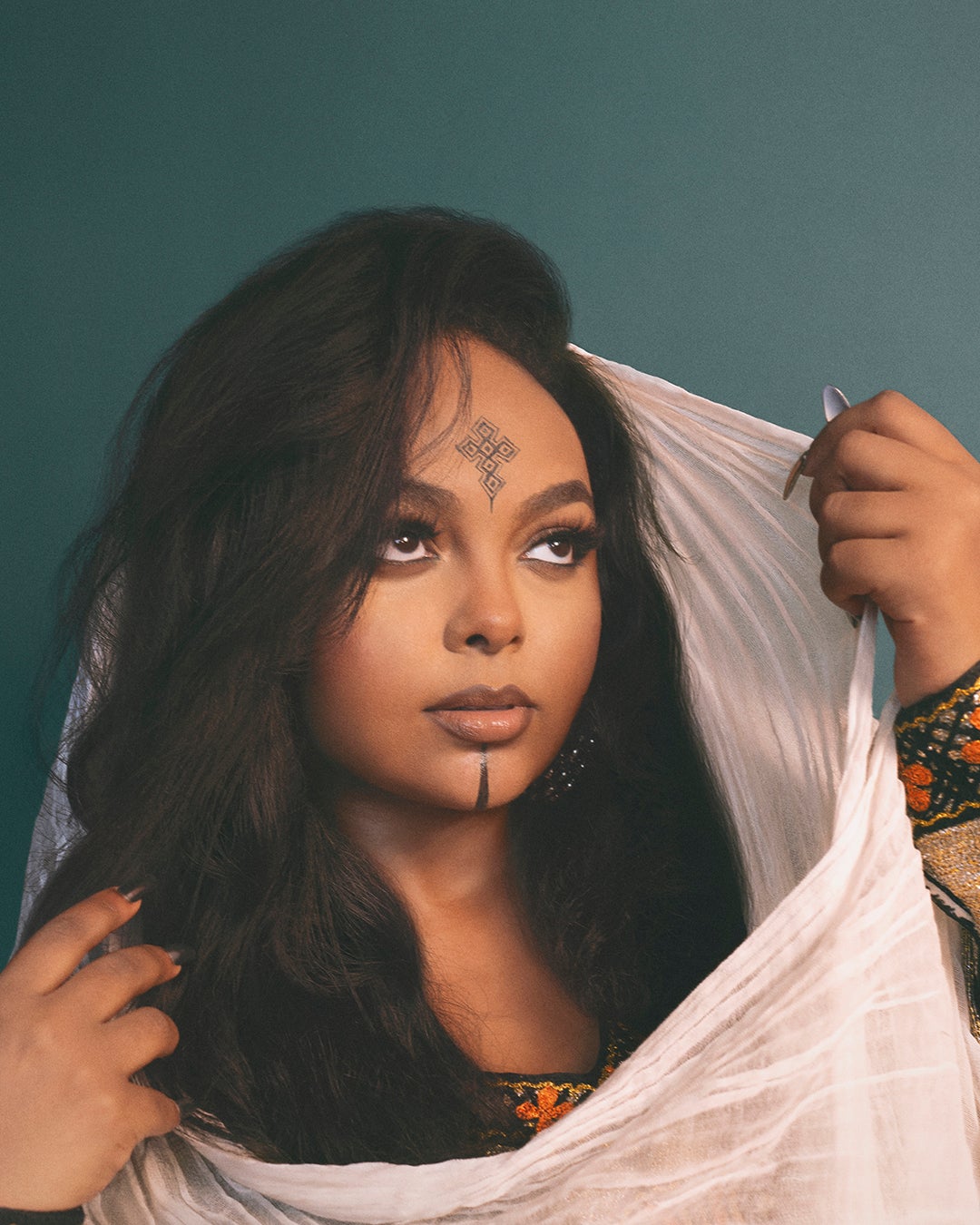
To return to Ethiopia after years away, as Wolle has, is to confront the contradictions of both the past and present—what has been lost, and what is being remade. Ethiopia has always been a source of artistic energy, a wellspring of inspiration that could not be dulled by time or distance.
Yet now, there is a collective return, a convergence of old and new worlds, with artists like Wolle serving as both documentarians and participants in this unfolding rebirth. ”Meskel Flower” encapsulates this complexity, paying tribute to the nuances of rebuilding while also honoring Wolle’s declarations. Most importantly, it centers on who she is as an Ethiopian-American while also weaving paths to the living symbols that maintain the bridges of heritage across oceans.
Credits:
Founder & Creative Director | Ruhama Wolle
Photographer | Elianel Clinton
Executive Producer | May Lin Le Goff
On-Set Producer | Tae McKenzie-Fisseha
Production Designer | Rediet Haddis
Set Designer | Zacharie Adams
Floral Set Designer | Alexandra Folino
Lighting Director | Saoni Fortuna
Stylist/Accessories | Rachael Bettencourt
Hair Stylist | Karla Serrano
Isabella Diana | Makeup Artist
Videographer & Video Editor | Anthony Nazario
BTS Videographer | Qieara Lesesne
Prop + Set Assistant | Emma Takele
Production Assistant | Redeate Wolle
Production Assistant | Mahlet Habtu
Photo Assistant | Cesar Cordone
Set Design Assistant | Cameron Gonzalez
Post Production | Cat Trzaskowski
Layout Designer | Christopher Quarterman
Models: Ruhama Woole, Lili Solomon, Ephrata Abate, Gelila Feleke, Tae McKenzie-Fisseha







